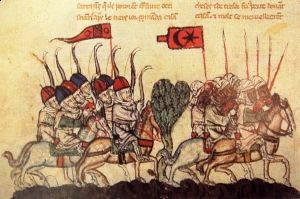Sunday 27 December 2015

Drawing, left: The 1299 Battle of Homs (Battle of Wadi al-Khazandar). The Mongols under Ghazan defeated the Mamluks.
Sections of Syria were held by French, English, Italian and German overlords between 1098 and 1189 AD during the Crusades and were known collectively as the Crusader states among which the primary one in Syria was the Principality of Antioch. The coastal mountainous region was also occupied in part by the Nizari Ismailis, the so-called Assassins, who had intermittent confrontations and truces with the Crusader States. Later in history when "the Nizaris faced renewed Frankish hostilities, they received timely assistance from the Ayyubids."
After a century of Seljuk rule, Syria was largely conquered (1175–1185) by the Kurdish warlord Saladin, founder of the Ayyubid dynasty of Egypt. Aleppo fell to the Mongols of Hulegu in January 1260, and Damascus in March, but then Hulegu was forced to break off his attack to return to China to deal with a succession dispute.
A few months later, the Mamluks arrived with an army from Egypt and defeated the Mongols in the Battle of Ain Jalut in Galilee. The Mamluk leader, Baibars, made Damascus a provincial capital. When he died, power was taken by Qalawun. In the meantime, an emir named Sunqur al-Ashqar had tried to declare himself ruler of Damascus, but he was defeated by Qalawun on 21 June 1280, and fled to northern Syria. Al-Ashqar, who had married a Mongol woman, appealed for help from the Mongols. The Mongols of the Ilkhanate took the city, but Qalawun persuaded Al-Ashqar to join him, and they fought against the Mongols on 29 October 1281, in the Second Battle of Homs, which was won by the Mamluks.
JOHN BATCHELOR SHOW
Hour One
Sunday 27 December 2015 / Hour 1, Block A: Dr. Sebastian Gorka, Major General Matthew C. Horner Distinguished Chair of Military Theory, Marine Corps University. In re: Arab nations are uniting to fight ISIS, but reasons they are doing so are unclear. http://www.cnn.com/2015/12/14/middleeast/islamic-coalition-isis-saudi-arabia/
Sunday 27 December 2015 / Hour 1, Block B: Sam LaGrone, Editor, U.S. Naval Institute News. In re: The Littoral Combat Ship program suffers another setback – a breakdown at sea that will last until February. http://news.usni.org/2015/12/23/littoral-combat-ship-uss-milwaukee-repairs-estimated-to-extend-into-february
Sunday 27 December 2015 / Hour 1, Block C: Ron Marks, Senior Fellow, George Washington University Center for Cyber and Homeland Security. In re: Hillary Clinton suggests a “Manhattan Project” to promote collaboration between the tech community and the government, but there are good reasons why the relationship is tense.
Sunday 27 December 2015 / Hour 1, Block D: Ron Marks, continued; in re: The Juniper Networks hack exposed a collaboration with the NSA that was previously unknown, except maybe to Snowden. http://foreignpolicy.com/2015/12/23/when-the-nsa-is-a-hackers-best-friend/
Hour Two
Sunday 27 December 2015 / Hour 2, Block A: John Bennett, White House reporter, CQ Roll Call; in re: Where is the Arab ground force that President Obama and both Democrats and Republicans in Congress are calling for to fight ISI? http://blogs.rollcall.com/white-house/candidates-obama-chase-mythical-arab-ground-force/
Sunday 27 December 2015 / Hour 2, Block B: Guy Taylor, National Security Team Leader, Washington Times; in re: U. S. government knows how to hit ISIS propaganda centers, but has
reasons for – so far - not doing so. http://www.washingtontimes.com/news/2015/dec/14/us-has-mapped-isis-propaganda-centers-but-wont-lau/print/
Sunday 27 December 2015 / Hour 2, Block C: Steve Hanke, professor of applied economics and co-director of the Institute for Applied Economics, Global Health, and the Study of Business Enterprise, Johns Hopkins University; senior fellow and director of the Troubled Currencies Project at the Cato Institute; in re: the popularity of the concept of Secular Stagnation, even though it’s been disproven since right after World War II, and what the term really means.
http://www.cato.org/publications/commentary/us-secular-stagnation
Sunday 27 December 2015 / Hour 2, Block D: Steve Hanke, continued. Secular stagnation, continued.
Hour Three
Sunday 27 December 2015 / Hour 3, Block A: Curt Mills, reporter, Washington Examiner; in re: Political intrigue in the Democratic Party. The Sanders campaign says the employee now accused of wrongdoing regarding a DNC database was recommended to the campaign by the DNC. http://www.washingtonexaminer.com/sanders-aide-rips-dnc-says-they-recommended-fired-staffer/article/2579105
Sunday 27 December 2015 / Hour 3, Block B: Jim Antle, Politics editor, Washington Examiner; in re: there’s more to life than politics, but it doesn’t seem like it right now.
http://www.washingtonexaminer.com/yes-virginia-there-is-life-beyond-politics/article/2579068
Sunday 27 December 2015 / Hour 3, Block C: Gordon Chang, Forbes.com; in re: Japan and China get closer to a faceoff in the South China Sea.
http://news.yahoo.com/japan-says-armed-china-ship-infiltrates-off-disputed-144537076.html
Sunday 27 December 2015 / Hour 3, Block D: Gordon Chang, Forbes.com, continued.
Hour Four
Sunday 27 December 2015 / Hour 4, Block A: Ted Merwin, author, Pastrami on Rye: An Overstuffed History of the Jewish Deli. http://amzn.to/1OSsGBe (1 of 4)
Sunday 27 December 2015 / Hour 4, Block B: Ted Merwin, author, Pastrami on Rye: An Overstuffed History of the Jewish Deli. http://amzn.to/1OSsGBe (2 of 4)
Sunday 27 December 2015 / Hour 4, Block C: Ted Merwin, author, Pastrami on Rye: An Overstuffed History of the Jewish Deli. http://amzn.to/1OSsGBe (3 of 4)
Sunday 27 December 2015 / Hour 4, Block D: Ted Merwin, author, Pastrami on Rye: An Overstuffed History of the Jewish Deli. http://amzn.to/1OSsGBe (4 of 4)